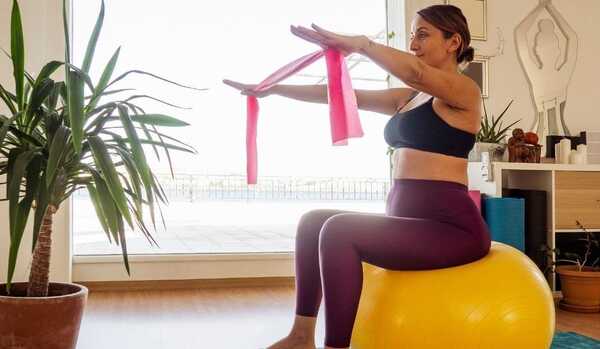
Michelle Baynham
08 Feb 2022
Performing pilates in pregnancy is a fantastic way to stimulate numerous muscle groups while making you more supple. Pilates also helps relieve stress and tension on joints while easing pregnancy aches and pains.
Similar to yoga, pilates recruits deep breathing techniques. Pilates however has more of a focus on improving posture with low impact. This makes it a perfect form of exercise for pregnant mamas to implement into their weekly routine!
Pilates works muscles and improves flexibility without putting too much strain on bones and joints.
Why you should be doing Pilates in pregnancy
Pilates gets the core muscles firing thus helping you prepare your body for carrying the extra weight of a growing baby. Performing Pilates in pregnancy also helps condition your body for both childbirth and postpartum recovery due to the increase in core strength. The added stimulus on the pelvic floor is also vital for the postpartum stage to help recovery time and avoid any leaking mishaps when you sneeze, cough, run and laugh. To help strengthen your pelvic floor click here.
Is Pilates safe in early pregnancy?
Pilates in pregnancy is completely safe and should be part of every pregnant woman’s fitness regime. Just be cautious with particular movements and stretches to not overdo it. When you get to the 3-month stage of being pregnant, I would advise avoiding any exercise that have you lying on your back. This is why it’s SO important to have a specific pregnancy Pilates class that is catered to pregnant women. Classes should always be taught by a qualified pregnancy specialist that tailors and adapts exercises to your pregnancy journey. You can discover our very own Pilates in Pregnancy classes here with qualified pregnancy and postpartum pilates expert, Jemma Winborn.
What are the benefits of performing Pilates in pregnancy?
Strengthens core and glutes
When pregnant, your body releases a hormone known as relaxin. Relaxin makes ligaments within the pelvis highly flexible and supple while softening the cervix. This added suppleness from relaxin can make you prone to injury, especially within the lower back, hips and pelvis. Pilates is a wonderful exercise to help combat risk of injury, with a focus on adding support and stability in these areas. Because of this, Pilates is quite simply one of the best exercises to reduce pregnancy aches and pains.
Relives back pain
Pilates stimulates your pelvic core, therefore helping you improve posture, thus relieving back pain. As you continue with your routine, you’ll slowly begin to notice the added stability within your back and pelvis, making jobs and tasks in everyday life much easier.
When pregnant, your body releases a hormone known as relaxin. Relaxin makes ligaments within the pelvis highly flexible and supple while softening the cervix. This added suppleness from relaxin can make you prone to injury, especially within the lower back, hips and pelvis. Pilates is a wonderful exercise to help combat risk of injury, with a focus on adding support and stability in these areas. Because of this, Pilates is quite simply one of the best exercises to reduce pregnancy aches and pains.
Relives back pain
Pilates stimulates your pelvic core, therefore helping you improve posture, thus relieving back pain. As you continue with your routine, you’ll slowly begin to notice the added stability within your back and pelvis, making jobs and tasks in everyday life much easier.
Breathing control
One of the biggest takeaways from Pilates for pregnancy is the added control of breathing patterns, which is a huge tool when it comes to labour. As you journey through pregnancy, you may start to develop a firm/stiff feeling in the upper back. This can become an obstacle for deep breathing exercises. Pilates improves flexibility in this area which helps developing a deep breathing technique for childbirth.
One of the biggest takeaways from Pilates for pregnancy is the added control of breathing patterns, which is a huge tool when it comes to labour. As you journey through pregnancy, you may start to develop a firm/stiff feeling in the upper back. This can become an obstacle for deep breathing exercises. Pilates improves flexibility in this area which helps developing a deep breathing technique for childbirth.
Pilates in pregnancy precautions
Of course, Pilates is a safe exercise to perform during pregnancy, however, several precautions must be taken to avoid injury and provide an effective workout.
Make sure to find a pregnancy specialist when it comes to pilates. They will be able to gauge the condition of your posture and pelvic floor and tailor the perfect pilates routine specific to your pregnancy.
- Take it at your own pace. Listen to your body, don’t over-excise.
- Completely avoid adnominal exercises such as crunches, curls or anything that places too much demand on your abdominal wall.
- Do not overstretch and place unneeded stress on joints.
- Be wary of your balance as your body changes through pregnancy. Try not to get up from the floor in a hurry.
- During the second part of your pregnancy journey, don’t lie flat or raise your feet over your head. This can add unwanted pressure on blood vessels which further causes less blood travelling to the heart.
- Exercise about 1-2 hours after every meal.
- Drink plenty of water and never exercise in hot or humid surroundings.
- If you ever feel any form of pain and discomfort, stop immediately.

Michelle Baynham
Share this article

